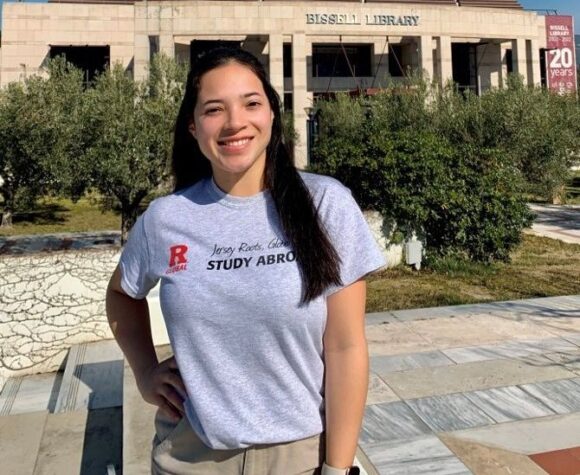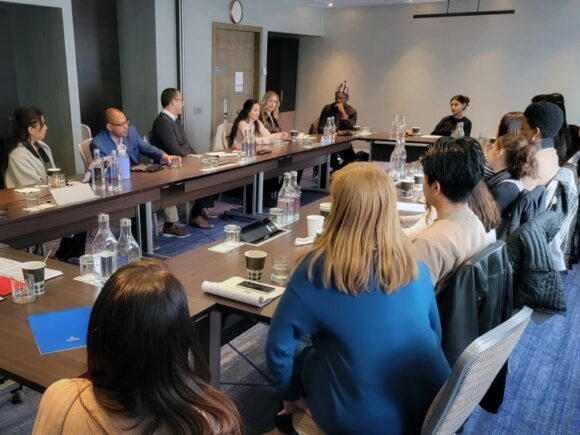
Kendall Soto SEBS’24
Kendall Soto (SEBS’24), EPIB major, is currently spending a semester abroad in Greece. Kendall recently joined 11 other study-abroad students as a Global Justice Fellow at a conference in London with President Holloway, international Rutgers Alumni, university administrators from RU-Global and ISGRJ-Newark, as well as local activists, to explore and converse about the possible ways we can contribute to create more just society.
Why did you decide to spend a semester abroad?
I am studying Environmental Policy, Institutions, and Behaviors (EPIB) and taking a semester abroad is an opportunity to see how the world looks from a new perspective! So far, I am enrolled in four courses, some meet SEBS Core requirements, my major requirements, and electives. One, in particular, is an anthropology course called Intercultural communications. This course has been very empowering as we have had to reflect on our own internal biases to prepare for future miscommunications that come with being from a particular culture. I wanted to be immersed into a different lifestyle for a long period of time to learn about the wide range of ideas and values that are so natural for others.
At the American College of Thessaloniki, I have been so impressed with their willingness to invite us into the Greek community, with frequent cultural excursions and activities, such as museum tours and service-learning opportunities. I currently volunteer with fourth grade students in the classroom and help expose them to English through reading, arts, and lots of friendly encouragement!
Tell us about your major.
My major is Environmental Policy, Institutions, and Behaviors where we study the social and natural science applications to solving how societies and institutions respond to environmental affairs.
The program is especially engaging and supportive. Our small class sizes at this large university have helped me grow as a student and introduced me to the opportunities in environmental law, sustainability operations, and communications.
Discussing global issues during the fellowship helped center my perspective in my studies. I have become more passionate about resiliency and community. Global Justice in my major means using research and policy to support the influx of Internally Displaced Persons due to natural disasters, rising sea levels, and other environmental hazards.

President Jonathan Holloway, Kendall Soto to his right and the other Global Justice Fellows and guest visitors.
You recently served as a Global Justice Fellow with other study-abroad students. What was that like?
The Global Justice Fellows participated in a workshop to nurture cross-cultural and justice-focused leadership skills. In addition to students, the roundtables included President Holloway, international Rutgers Alumni, university administrators from RU-Global and ISGRJ-Newark, as well as local activists. It was a unique opportunity to collect members of the Rutgers community abroad and converse about the possible ways we can contribute to create more just society.
As a member of the first ever cohort of 12 of the Rutgers Global Justice Fellows, I was excited and grateful to have the opportunity to talk activism with like-minded individuals.
The fellowship was an invitation to explore issues of migration, displacement, and belonging. We discussed what it would take for Rutgers to expand the inclusivity of a beloved community.
Initially we explored when community was present and absent for us. As a Hispanic and Asian American, I recalled the stories of my parents and what it took for them to find communities. Comparing our stories brought me closer to my peers and we all agreed that we could see how respect and vulnerability created a beloved community in front of our eyes.
What I learned during the fellowship is that many of my peers at Rutgers are working very hard to have a positive an impact on others. Activism can feel tiring and lonely, but connected, we can elevate our work, recognize impact at all scales, and motivate each other.
The program’s encouragement and mutual vulnerability created a safe space for my peers and I to be proud of the journey that comes with creating a career and lifestyle around justice. I learned how critical introspection is for gaining cultural competence and by the conclusion of the fellowship program, I felt empowered to take on any obstacles to achieving inclusivity in all future spaces I enter.
The past few years, I have studied the variety of ways the environmental crises effects and influences the cultural and political decisions impacting the global community. Therefore, I believe this weekend’s long conversation about the ways we can become more connected and justice-focused is exactly what I was looking for when I entered a program to study abroad.
What was it like working with President Holloway?
It was great! President Holloway has mentioned before that he looks forward to the opportunity to converse with students. I learned while currently serving on the President’s Student Advisory Committee.
What are you plans for the future and how has SEBS prepared you for it?
How often do we acknowledge the work it took to build our Rutgers family? When I got to Rutgers in 2020, I never dreamed of the incredible opportunities that the SEBS community, my major, the student assembly, and environmental organizations like Climate Reality and Students for Environmental Awareness would provide.
Beyond technical education, this Rutgers community, in New Jersey and abroad, is here for me. During my time at Rutgers, I have gained several new role models and mentors, including Mayte Green-Mercado from the amazing Global Racial Justice Department in Newark, and Dan Waite from the very department that brought me abroad, Rutgers Global.
I hope to work in environmental, sustainable, governance and lead teams into transforming the footprint of institutions around the world and their local communities. When I graduate from Rutgers and pursue a career of my own, I am confident that with respect and vulnerability, I can find more beloved communities to empower my journey.

